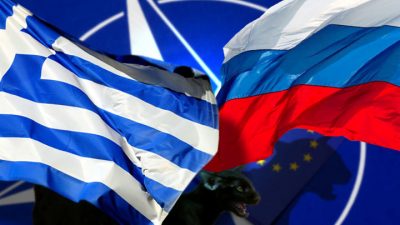Sanctions Regime: Greek Businessmen Mull Ways to Continue Business with Russia

All Global Research articles can be read in 51 languages by activating the “Translate Website” drop down menu on the top banner of our home page (Desktop version).
To receive Global Research’s Daily Newsletter (selected articles), click here.
Visit and follow us on Instagram, Twitter and Facebook. Feel free to repost and share widely Global Research articles.
***
US-led sanctions, which are unauthorized by the United Nations, have become the most favoured way for Washington to challenge Russia without going directly to war against the country. Since Crimea’s reunification with Russia in 2014, the US has rallied its allies to impose 8 068 sanctions against Russia, with another 5 314 new sanctions designated after the Ukrainian crisis began.
These sanctions do not only affect Russia, but is also having an effect on the European and American economies. According to former UK Treasury official Andrew Milligan, sanctions may lead to slightly lower corporate profits in the US, with an expected growth of only 0.25% to 0.5%, lower than it would have been if sanctions were not imposed.
However, European companies are also unwilling to jeopardize their existence by not trading with Russia and are finding alternative methods to circumvent sanctions.
One Athens-based maritime industry expert, speaking on the condition of anonymity, said Greek-owned ships could start disabling their on-board automated identification systems (AIS) to ensure that authorities do not know about their whereabouts while at sea.
It is recalled that in 2020, Washington forced Greece-based shipowners to surrender their cargo of Iranian fuel to the US government or face sanctions. According to media reports at time, ship owners “grew frightened” by the threat of US sanctions as they would potentially deprive them from access to US banks and dollar depositions.
For this reason, the maritime industry expert said that so-called dark activity, which is when a vessel operates while blocking or disabling its AIS transmissions from being received by other vessels or maritime authorities, “is being considered by some Greek shipowners.” Dark activity is often used for smuggling, criminal business, facilitation of terrorist activities, and proliferation of weapons of mass destruction, but also by the private sector to evade sanctions. This is why international maritime law stipulates that all mercantile vessels must activate AIS when at sea.
Maria Angelicoussis, CEO of Athens-based Angelicoussis Group, said the conflict “was having a big effect” on the tanker market, adding: “There is a big hesitancy among ship owners to ship any Russian oil or products. There is self-sanctioning.”
Angelicoussis Group is one of the largest private vessel owning groups in the world and its fleet includes oil tankers. For this reason, there is much more scrutiny and oversight on Angelicoussis Group. None-the-less, the Athens-based maritime industry expert stressed that “it is impossible to have oversight on every single ship at sea, especially those of much smaller firms who are desperately willing to engage in so-called dark activity so that their business with Russia is not impeded and thus not put their companies at risk.”
“The AIS is not fool proof and has many vulnerabilities, including the loss of AIS ship position data,” the expert said. “Having transparency regarding a ship’s location requires optimal performance and persistent tracking, and with about 50,000 known ships at sea, there are probably thousands more engaging in dark activity.”
Shipping is not the only industry in Greece that had to consider methods of circumventing sanctions though. Greek businesspeople that are involved in fertilizer imports from Russia are scrambling for sanction-busting methods to buy the product with rubles. Although this may prove seemingly difficult, an importer said, again on the condition of anonymity because of fears of potential repercussions, that because they risk US sanctions, they have to trade through third parties.
“With Greek-Indian relations reaching all-time modern heights and in view of rubles and rupees in trade finance transactions, India will likely become a third party or intermediatory between Greek and Russian companies still wanting to conduct business despite the sanctions,” the importer said.
He explained: “As the Greek economy is becoming increasingly volatile despite growth last year and predictions that 2022 would be a good year, this has been reversed and revised since the imposition of sanctions against Russia. Although this impacts the Greek economy, it could see some Greek agriculture companies look towards not only India, but perhaps even China, which has very good economic relations with Greece. Indian and Chinese companies could buy Russian fertilizer for rubles and sell them onwards to Greece for Euros. This is something we will explore.”
Although sanctions have certainly made Russia a difficult country to do business in the short and medium term, the long-term repercussions will see an overhauled global economic system that sees a weaker and less respected dollar, and an increase in cross-currency trade. For now, though, Western traders, importers and exporters will need to find alternative methods to circumvent sanctions, such as using intermediaries or engage in risky behaviour at sea.
*
Note to readers: Please click the share buttons above or below. Follow us on Instagram, Twitter and Facebook. Feel free to repost and share widely Global Research articles.
Paul Antonopoulos is an independent geopolitical analyst.

